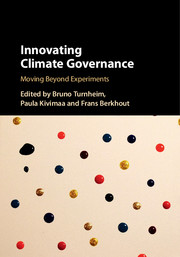Book contents
- Innovating Climate Governance
- Innovating Climate Governance
- Copyright page
- Contents
- Contributors
- Preface
- 1 Beyond Experiments
- 2 Global Climate Governance after Paris
- Part I Experiments
- Part II Beyond Experiments
- 7 Developing Transformative and Orchestrating Capacities for Climate Governance Experimentation in Rotterdam
- 8 The Pilot Paradox
- 9 Policy Pilots for Climate Adaptation in Indian Agriculture
- 10 Evaluating Climate Governance Experiments
- 11 The City of Permanent Experiments?
- 12 Experiments and Beyond
- Index
- References
8 - The Pilot Paradox
Exploring Tensions between Internal and External Success Factors in Dutch Climate Adaptation Projects
from Part II - Beyond Experiments
Published online by Cambridge University Press: 29 March 2018
- Innovating Climate Governance
- Innovating Climate Governance
- Copyright page
- Contents
- Contributors
- Preface
- 1 Beyond Experiments
- 2 Global Climate Governance after Paris
- Part I Experiments
- Part II Beyond Experiments
- 7 Developing Transformative and Orchestrating Capacities for Climate Governance Experimentation in Rotterdam
- 8 The Pilot Paradox
- 9 Policy Pilots for Climate Adaptation in Indian Agriculture
- 10 Evaluating Climate Governance Experiments
- 11 The City of Permanent Experiments?
- 12 Experiments and Beyond
- Index
- References
Summary
- Type
- Chapter
- Information
- Innovating Climate GovernanceMoving Beyond Experiments, pp. 145 - 165Publisher: Cambridge University PressPrint publication year: 2018
References
- 7
- Cited by



